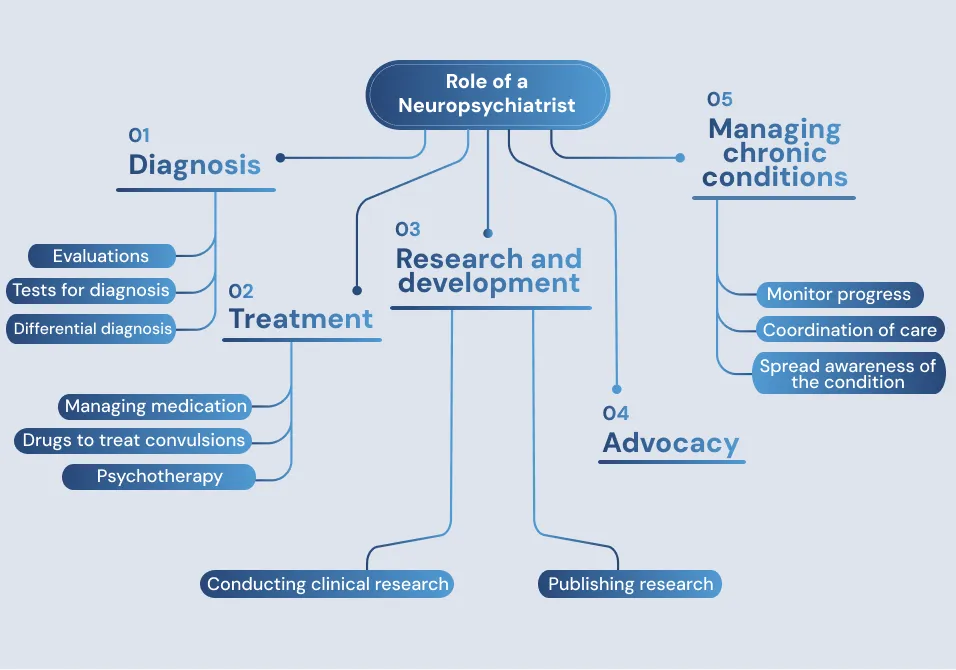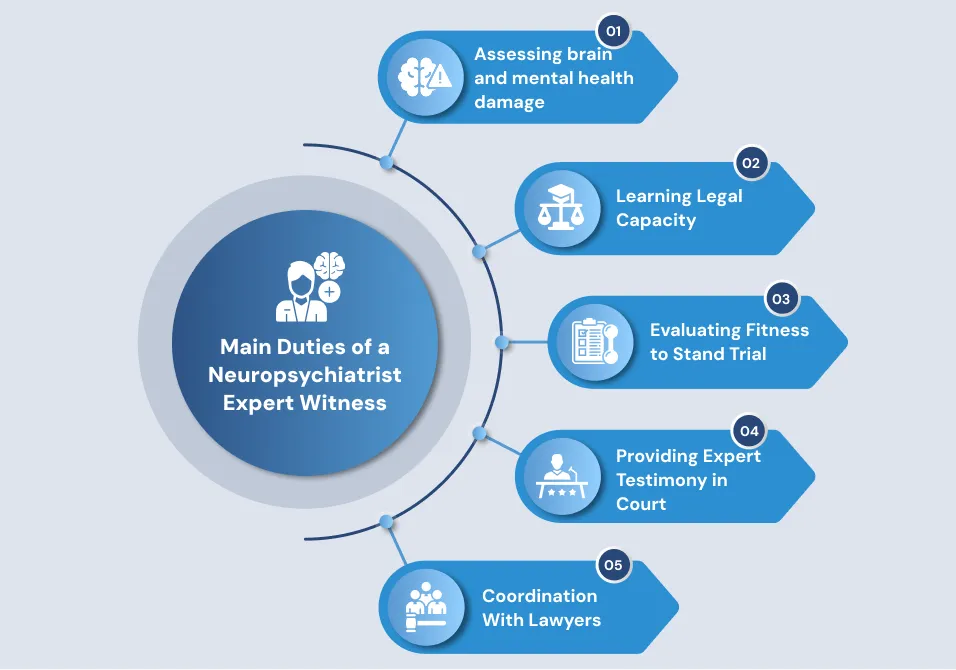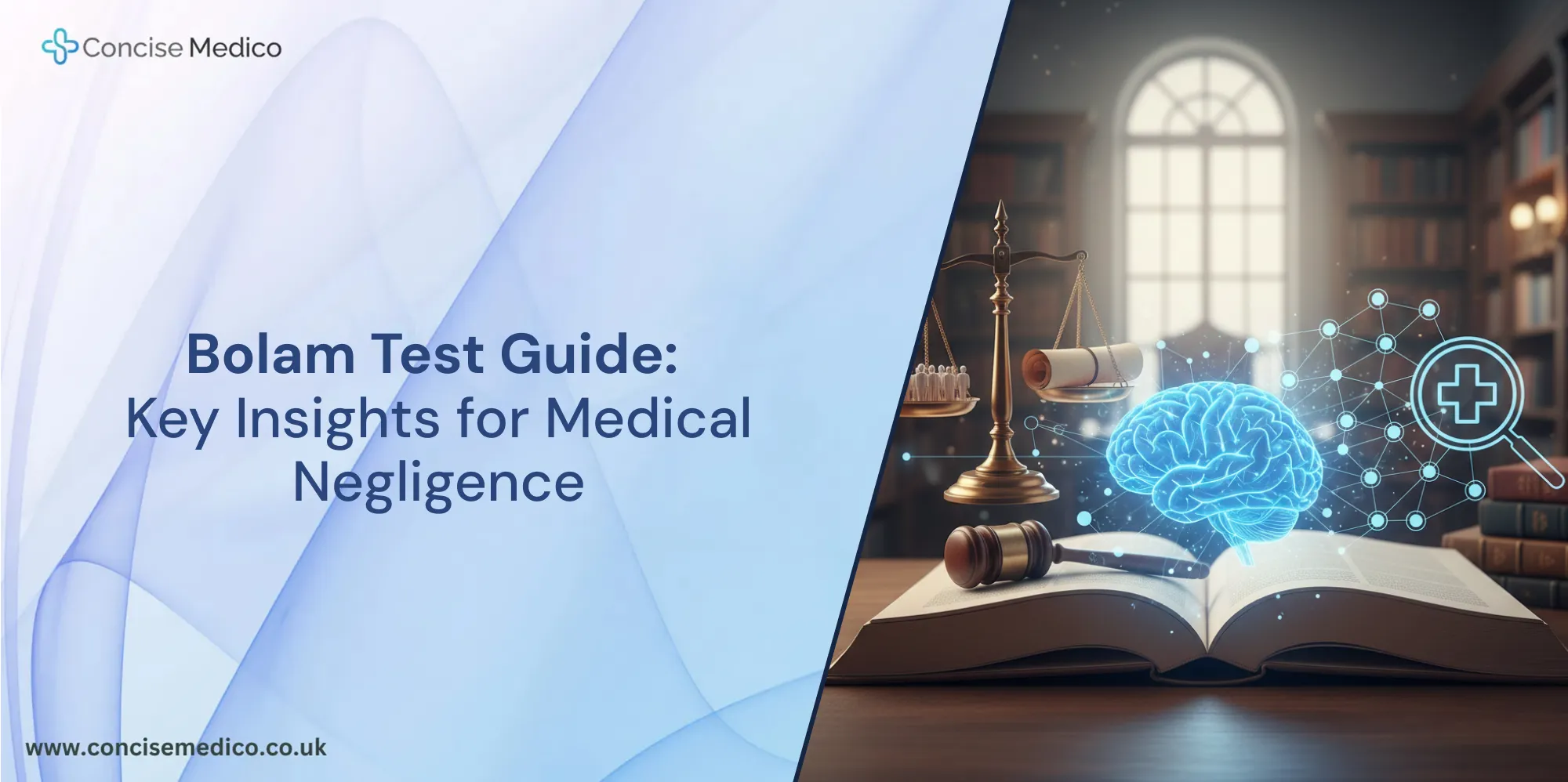TABLE OF CONTENT
Approximately one in three individuals is affected by neurological issues worldwide. They may stem from genetics, past traumatic experiences or other factors. Challenges and responsibilities in one’s life may also cause mental health issues. That is where the role of a neuropsychiatrist comes in. They can use their expertise in medicine to assess them and make treatment plans. In courts, they contribute by providing evidence in the form of expert reports. This helps courts rule out the impact of mental health on the case in question. This blog covers all about the neuropsychiatrists. It also covers the duties of neuropsychiatrists in medico-legal cases.
What is a neuropsychiatrist?
A doctor who is trained in both neurology and psychiatry is called a neuropsychiatrist. They assess the mental disorders and brain health of the patients. They are skilled in finding structural or functional issues in the brain.
What do neuropsychiatrists do?
They are experts in diagnosing psychological symptoms. These symptoms must be linked to a neurological disorder such as:
Brain injury:
If you have suffered a brain injury, you may face the following problems:
- Mental problems.
- Emotional problems.
- Behavioural problems.
You may turn irritable, impulsive and unstable. You may also experience apathy. Ever since the focus has shifted to treating the effects of brain injury, fewer people have died from this.
Epilepsy
The type of mental issue you get from epilepsy depends on which part of the brain it affects. You may get depression and anxiety. You may experience a feeling of slowing down, accompanied by memory issues. You may also get attention problems. Fear, irritation, and stress are also common.
Parkinson’s disease
You may feel a range of mental issues because of it. Depression and anxiety are very common. 50% of the patients experience it. You may also have memory problems. Some people may get hallucinations, too.
Huntington’s disease
If you suffer from this disease, you are likely to experience mental issues. Being obsessive, irritable, and impulsive are a few of them. You may also feel higher apathy. These issues worsen your social, economic and marital life.
MS (Multiple Sclerosis)
If you have MS, you can be depressed and anxious. Depression can be an effect of MS or a symptom. Anxiety can occur on its own or with depression. Another major mental health issue is a disconnect between how you feel and behave. For instance, you might not be sad but start crying.
You might not have a diagnosis when you visit a neuropsychiatrist. They might consult these doctors due to their respective symptoms.
If you happen to know of any such case, you should research ‘neuropsychiatrist near me’. You can then opt for the right option.
How to become a Neuropsychiatrist:
The steps to getting this professional degree are like any other medical degree. You have to get a bachelor’s degree. After that, you go to medical school to get an MD degree. Then, your residency would be in neurology, psychiatry or both. You can get specialised training by getting a fellowship in neuropsychiatry. After this, you can get board certifications.
Role of a neuropsychiatrist
Generally, like most doctors, they help their patients fight their disease. They offer a cure for the patient’s mental issues. They also assist them with their symptoms.
These doctors perform the following roles:
1. Diagnosis:
It is one of their primary duties to diagnose the medical issues related to their field. They do it in the following ways:
Evaluations:
Neuropsychiatrists perform evaluations in detail. This involves taking medical histories in detail. This allows them to gather data about their patient, such as family and medical history.
Another evaluation that they perform is a neurology exam. This helps them find out about a patient’s reflexes. It also helps them evaluate how you react to pain or touch. Your memory, attention, and problem-solving are also tested.
They also assess your psychology. They also observe your mood, behaviour, speech, planning and decision-making. They do this to check for any mental issues.

Tests for diagnosis:
For this, neuropsychiatrists assess the activity of the brain using scans. Any abnormality here can help them find out what is wrong. Some of the tools that they can use are CT scans, MRIs and EEGs.
Differential diagnosis:
It means figuring out what disease is causing certain symptoms. This can be hard if diseases look very similar. The doctor rules out other possible diseases with similar symptoms. This enables them to make the most accurate diagnosis.
This diagnosis can encompass two types of issues:
Primary issues:
These issues involve feelings and emotions. They are not caused directly by any physical damage. Some of these include anxiety, depression, bipolar disorder, etc.. They cause the brain to function differently.
Secondary issues:
The secondary sources include injuries or illnesses that alter brain function.
2. Treatment:
The treatment depends upon the problem itself. This is because each one of these injuries or diseases is different from the other. Hence, they are treated accordingly.
For some symptoms, neuropsychiatrists prescribe drugs. For others, they offer counselling and therapy.
You might be given a more customised treatment. This depends on how severe your disease is. The clinical presentation of your disease is also a factor. They may also check the exact cause of your disease for a care plan.
Managing medication:
Neuropsychiatrists prescribe the following medications for psychiatric symptoms:
Antidepressants:
They are prescribed for depression. Sometimes, neuropsychiatrists will also give them to people who are anxious. They can be chosen from a broad category of SSRIs, SNRIs and other relevant medicines.
Mood stabilisers:
They are prescribed to treat mood swings. If you are aggressive or irritable, they may help you. They are also chosen from a wide range.
Antipsychotics:
Neuropsychiatrists use them in cases of mental issues with psychotic symptoms. This means they are used to treat delusion, hallucination, aggression and behaviour problems.
Neurology medicines
They also prescribe medicines for neurological symptoms: For instance:
- Parkinson’s disease drugs:
They help with physical symptoms of the disease. These include tremors, stiffness, and slow movements.
- Drugs to treat convulsions:
They treat seizures. They can be helpful for epilepsy and stabilising moods.
Neuropsychiatrists make sure to adjust doses. This is because patients are sensitive due to their mental issues.
Psychotherapy:
They may provide therapy themselves or refer patients to psychologists. Counsellors can also be contacted for therapy. The following types of therapy can be used:
- CBT
- Supportive therapy:
Cognitive recovery:
It is brain training that these doctors provide. It is aimed at restoring memory, attention, and functioning. It involves memory exercises such as puzzles, games, tasks, etc.. They help the patients practice these tasks daily. Patients are able to regain the functions that they had lost.
3. Research and development
A lot of these doctors can take part in research. The purpose of this is to advance the understanding of their field. It also helps them find better cures.
Conducting clinical research:
Neuropsychiatrists conduct research and clinical steps. This is a major step in exploring new tools, cures, therapies, etc.. This also expands the knowledge about such treatments.
Publishing research:
After carrying out the research, these doctors publish it in medical journals. This contributes to scientific literature. The information is helpful to other scientists working on these issues.
4. Advocacy:
This is another very important role that neuropsychiatrists play. Their advocacy is aimed towards reducing stigma. They also work for increased access to care. They speak at conferences to increase awareness. They also conduct workshops. They provide training to their juniors so they understand diseases better.
5. Managing chronic conditions
If you have a chronic condition, you’ll require constant care. Neuropsychiatrists support you in this. They have to provide you with long-term stability and a better quality of life. They do the following for this:
Monitor progress:
They track your symptom changes. They evaluate how much the treatment is working and adjust the care plan based on this. They also manage side effects if there are any.
Coordination of care:
They work in a team with a team of other relevant doctors. This ensures that the patient is getting well-rounded care.
Spread awareness of the condition
Chronic conditions impact your life in multiple ways. They also have an impact on your family. If you’re aware of your prognosis, it helps you deal better. It also teaches you coping strategies. It prepares you for any challenges that you may come across.
Case study
The case of Phineas Gage is a landmark one in neuropsychiatry. He was a railroad foreman. The incident took place in 1848. A 2.5-foot-long iron rod accidentally drove through his skull. It entered through his cheekbone and exited the top of his head. This resulted in a serious brain injury. The events that followed were quite surprising. A few minutes after the accident, Gauge began to speak. He walked on his own with a little help to go to the doctor.
Gage went to Dr. John Harlow. He was the neuropsychiatrist. He also recorded his recovery. Gage suffered two major injuries. He lost his eye. He also had paralysis in some parts of his face. Yet, he gained good physical health for the most part. His personality was another story. He became rude and impatient. He also started using offensive language. This was very different from how he was before. His friends described the situation by saying he was no longer Gage.
Gage worked as a driver of a stagecoach in Chile years later. This implies that at least a few of his abilities were regained. These abilities were physical as well as mental. Almost twelve years after his incident, he passed away. It is widely thought that he died of seizures.
After his death, his skull and rod were given to Dr. Harlow. He sent them to the Medical Museum of Harvard.
Gage’s case showed how the frontal lobe of the brain affects personality. It also supported the fact that different parts of the brain play different functions.
Understanding a neuropsychiatrist expert witness
So, what is the role of neuropsychiatrists in medico-legal cases? These expert witnesses explain cases relevant to their fields in courts. They use their knowledge and their experience for this. Their help enables courts to be just to the accused and defendants, both.
Learn more about medico-legal experts here.
Main Duties of a Neuropsychiatrist Expert Witness
These experts help the courts in case an accused or defendant has a brain problem.
They can be called for the following kinds of people:
- A person’s brain injury affects their ability to think or behave normally.
- Someone who may not understand what’s happening in court
- If there are questions about a person’s mental state during a crime or decision-making
Here are the roles which neuropsychiatrist expert witnesses play in legal cases.
1. Assessing brain and mental health damage:
Neuropsychiatrist expert witnesses assist in legal cases of patients with prior brain issues. These issues can be injury or disease. They provide major help after medical mistakes or accidents. They explain if their illness affects the following:
- Behaviour
- Emotions
- Thinking

This is helpful to the courts in cases where other procedures may have caused damage to the brain. For instance, in a regular procedure, a person did not get enough oxygen to the brain. This caused a brain injury. They take a psychological assessment to examine the effect of these mistakes.
Patients who went through this ordeal might get scared of speaking in court. The injury may show symptoms that make social dealings hard. Neuropsychiatrists make sure that the environment in court is accommodating. These experts also work with the patient’s family to understand the effect of any prior issues.
Get a useful insight into personal Injury reports.
2. Learning Legal Capacity:
Another role of neuropsychiatrist expert witnesses is determining the legal capacity. Assume the person suffering from a brain disease makes a decision, such as a will. It can be questioned. Neuropsychiatrist expert witnesses explain whether the person had the capacity to do this. They also explain if the patient can take part in complex legal proceedings. Neuropsychiatrist experts also determine if a person can appoint someone on their behalf. In later stages of the disease, people may not be able to give power to someone. This helps the courts find out if a power of attorney is valid or not. These witnesses assess legal capacity in this regard.
Read More about Personal injury cases.
3. Evaluating Fitness to Stand Trial:
Suppose you have suffered an injury strong enough to show symptoms in mental health. You now face a criminal charge. You need someone to explain to the court. Neuropsychiatrist expert witnesses play this crucial role in criminal cases.
Understand the charges:
When a trial starts, the first step is explaining the charges. This is the right of the accused. The trial cannot proceed without it. Now, if you are on trial as someone with a brain injury/disease, you can have trouble grasping.
These experts check your condition. They, then, evaluate if you are getting what the lawyers are saying. The role of these experts, thus, establishes the validity of the trial.
Working with a lawyer:
These witnesses also ensure that a person is mentally fit to work with their lawyer. They find out if the person can:
- Talk to their lawyer
- Remember details
- Prepare for the case
Their role is, thus, important for justice to be done.
4. Providing Expert Testimony in Court
There is a lot of jargon used in medical cases. It can be hard for a jury to decide the case without help. A Neuropsychiatrist in such cases can provide expert testimony in court. They will translate complicated mental health concepts into terms that are clear. The testimony, thus, benefits the judges, juries, and other parties involved in the case.
“An expert may be called as a witness to a court to review and opine on a particular case. This opinion is sought by the court to better educate the counsel or judges and to provide clarity in the issues related.”
Channaveerachari et al.
Testimony for the mental state of the defendant:
Their expert opinion tells whether a person was in their right mind while they committed a crime. This is crucial for defences such as:
- Insanity plea: One does not understand what they did. Or if they understand their action, they are not aware of it being wrong. This was because of their mental illness.
- Diminished responsibility
- Acting without control
5. Coordination With Lawyers
Last, but not least, a neuropsychiatrist collaborates with legal professionals. They contribute their specialised knowledge. They are also in tune with the case’s mental health aspects. So, they assist in the following:
Findings:
Lawyers use expert witness reports from neuropsychiatrists. These help them show the data in the courtroom.
Bridging Law and Mental Health:
They ensure lawyers do not forget mental health needs while making legal arguments.
Advice on sentence and care needs:
They help the lawyers in recommending the right punishment. This includes suggesting the following:
- Long-term care for people who can’t live on their own
- Hospital order, i.e., instead of prison, people get a mental health facility.
Contact Concise Medico for consultation.
Neuropsychiatrists play a very crucial role as doctors and in legal cases. You might need testimonies, expert opinions, and reports to prove yourself in court:
At Concise Medico, we make sure that you get help in your case through all of these aspects. Our expert witnesses provide you with the support that you need.
To get help, contact us now.
FAQs
Approximately one in three individuals is affected by neurological issues worldwide. They may stem from genetics, past traumatic experiences or other factors. Challenges and responsibilities in one’s life may also cause mental health issues. That is where the role of a neuropsychiatrist comes in. They can use their expertise in medicine to assess them and make treatment plans. In courts, they contribute by providing evidence in the form of expert reports. This helps courts rule out the impact of mental health on the case in question. This blog covers all about the neuropsychiatrists. It also covers the duties of neuropsychiatrists in medico-legal cases.
What is a neuropsychiatrist?
A doctor who is trained in both neurology and psychiatry is called a neuropsychiatrist. They assess the mental disorders and brain health of the patients. They are skilled in finding structural or functional issues in the brain.
What do neuropsychiatrists do?
They are experts in diagnosing psychological symptoms. These symptoms must be linked to a neurological disorder such as:
Brain injury:
If you have suffered a brain injury, you may face the following problems:
- Mental problems.
- Emotional problems.
- Behavioural problems.
You may turn irritable, impulsive and unstable. You may also experience apathy. Ever since the focus has shifted to treating the effects of brain injury, fewer people have died from this.
Epilepsy
The type of mental issue you get from epilepsy depends on which part of the brain it affects. You may get depression and anxiety. You may experience a feeling of slowing down, accompanied by memory issues. You may also get attention problems. Fear, irritation, and stress are also common.
Parkinson’s disease
You may feel a range of mental issues because of it. Depression and anxiety are very common. 50% of the patients experience it. You may also have memory problems. Some people may get hallucinations, too.
Huntington’s disease
If you suffer from this disease, you are likely to experience mental issues. Being obsessive, irritable, and impulsive are a few of them. You may also feel higher apathy. These issues worsen your social, economic and marital life.
MS (Multiple Sclerosis)
If you have MS, you can be depressed and anxious. Depression can be an effect of MS or a symptom. Anxiety can occur on its own or with depression. Another major mental health issue is a disconnect between how you feel and behave. For instance, you might not be sad but start crying.
You might not have a diagnosis when you visit a neuropsychiatrist. They might consult these doctors due to their respective symptoms.
If you happen to know of any such case, you should research ‘neuropsychiatrist near me’. You can then opt for the right option.
How to become a Neuropsychiatrist:
The steps to getting this professional degree are like any other medical degree. You have to get a bachelor’s degree. After that, you go to medical school to get an MD degree. Then, your residency would be in neurology, psychiatry or both. You can get specialised training by getting a fellowship in neuropsychiatry. After this, you can get board certifications.
Role of a neuropsychiatrist
Generally, like most doctors, they help their patients fight their disease. They offer a cure for the patient’s mental issues. They also assist them with their symptoms.
These doctors perform the following roles:
1. Diagnosis:
It is one of their primary duties to diagnose the medical issues related to their field. They do it in the following ways:
Evaluations:
Neuropsychiatrists perform evaluations in detail. This involves taking medical histories in detail. This allows them to gather data about their patient, such as family and medical history.
Another evaluation that they perform is a neurology exam. This helps them find out about a patient’s reflexes. It also helps them evaluate how you react to pain or touch. Your memory, attention, and problem-solving are also tested.
They also assess your psychology. They also observe your mood, behaviour, speech, planning and decision-making. They do this to check for any mental issues.

Tests for diagnosis:
For this, neuropsychiatrists assess the activity of the brain using scans. Any abnormality here can help them find out what is wrong. Some of the tools that they can use are CT scans, MRIs and EEGs.
Differential diagnosis:
It means figuring out what disease is causing certain symptoms. This can be hard if diseases look very similar. The doctor rules out other possible diseases with similar symptoms. This enables them to make the most accurate diagnosis.
This diagnosis can encompass two types of issues:
Primary issues:
These issues involve feelings and emotions. They are not caused directly by any physical damage. Some of these include anxiety, depression, bipolar disorder, etc.. They cause the brain to function differently.
Secondary issues:
The secondary sources include injuries or illnesses that alter brain function.
2. Treatment:
The treatment depends upon the problem itself. This is because each one of these injuries or diseases is different from the other. Hence, they are treated accordingly.
For some symptoms, neuropsychiatrists prescribe drugs. For others, they offer counselling and therapy.
You might be given a more customised treatment. This depends on how severe your disease is. The clinical presentation of your disease is also a factor. They may also check the exact cause of your disease for a care plan.
Managing medication:
Neuropsychiatrists prescribe the following medications for psychiatric symptoms:
Antidepressants:
They are prescribed for depression. Sometimes, neuropsychiatrists will also give them to people who are anxious. They can be chosen from a broad category of SSRIs, SNRIs and other relevant medicines.
Mood stabilisers:
They are prescribed to treat mood swings. If you are aggressive or irritable, they may help you. They are also chosen from a wide range.
Antipsychotics:
Neuropsychiatrists use them in cases of mental issues with psychotic symptoms. This means they are used to treat delusion, hallucination, aggression and behaviour problems.
Neurology medicines
They also prescribe medicines for neurological symptoms: For instance:
- Parkinson’s disease drugs:
They help with physical symptoms of the disease. These include tremors, stiffness, and slow movements.
- Drugs to treat convulsions:
They treat seizures. They can be helpful for epilepsy and stabilising moods.
Neuropsychiatrists make sure to adjust doses. This is because patients are sensitive due to their mental issues.
Psychotherapy:
They may provide therapy themselves or refer patients to psychologists. Counsellors can also be contacted for therapy. The following types of therapy can be used:
- CBT
- Supportive therapy:
Cognitive recovery:
It is brain training that these doctors provide. It is aimed at restoring memory, attention, and functioning. It involves memory exercises such as puzzles, games, tasks, etc.. They help the patients practice these tasks daily. Patients are able to regain the functions that they had lost.
3. Research and development
A lot of these doctors can take part in research. The purpose of this is to advance the understanding of their field. It also helps them find better cures.
Conducting clinical research:
Neuropsychiatrists conduct research and clinical steps. This is a major step in exploring new tools, cures, therapies, etc.. This also expands the knowledge about such treatments.
Publishing research:
After carrying out the research, these doctors publish it in medical journals. This contributes to scientific literature. The information is helpful to other scientists working on these issues.
4. Advocacy:
This is another very important role that neuropsychiatrists play. Their advocacy is aimed towards reducing stigma. They also work for increased access to care. They speak at conferences to increase awareness. They also conduct workshops. They provide training to their juniors so they understand diseases better.
5. Managing chronic conditions
If you have a chronic condition, you’ll require constant care. Neuropsychiatrists support you in this. They have to provide you with long-term stability and a better quality of life. They do the following for this:
Monitor progress:
They track your symptom changes. They evaluate how much the treatment is working and adjust the care plan based on this. They also manage side effects if there are any.
Coordination of care:
They work in a team with a team of other relevant doctors. This ensures that the patient is getting well-rounded care.
Spread awareness of the condition
Chronic conditions impact your life in multiple ways. They also have an impact on your family. If you’re aware of your prognosis, it helps you deal better. It also teaches you coping strategies. It prepares you for any challenges that you may come across.
Case study
The case of Phineas Gage is a landmark one in neuropsychiatry. He was a railroad foreman. The incident took place in 1848. A 2.5-foot-long iron rod accidentally drove through his skull. It entered through his cheekbone and exited the top of his head. This resulted in a serious brain injury. The events that followed were quite surprising. A few minutes after the accident, Gauge began to speak. He walked on his own with a little help to go to the doctor.
Gage went to Dr. John Harlow. He was the neuropsychiatrist. He also recorded his recovery. Gage suffered two major injuries. He lost his eye. He also had paralysis in some parts of his face. Yet, he gained good physical health for the most part. His personality was another story. He became rude and impatient. He also started using offensive language. This was very different from how he was before. His friends described the situation by saying he was no longer Gage.
Gage worked as a driver of a stagecoach in Chile years later. This implies that at least a few of his abilities were regained. These abilities were physical as well as mental. Almost twelve years after his incident, he passed away. It is widely thought that he died of seizures.
After his death, his skull and rod were given to Dr. Harlow. He sent them to the Medical Museum of Harvard.
Gage’s case showed how the frontal lobe of the brain affects personality. It also supported the fact that different parts of the brain play different functions.
Understanding a neuropsychiatrist expert witness
So, what is the role of neuropsychiatrists in medico-legal cases? These expert witnesses explain cases relevant to their fields in courts. They use their knowledge and their experience for this. Their help enables courts to be just to the accused and defendants, both.
Learn more about medico-legal experts here.
Main Duties of a Neuropsychiatrist Expert Witness
These experts help the courts in case an accused or defendant has a brain problem.
They can be called for the following kinds of people:
- A person’s brain injury affects their ability to think or behave normally.
- Someone who may not understand what’s happening in court
- If there are questions about a person’s mental state during a crime or decision-making
Here are the roles which neuropsychiatrist expert witnesses play in legal cases.
1. Assessing brain and mental health damage:
Neuropsychiatrist expert witnesses assist in legal cases of patients with prior brain issues. These issues can be injury or disease. They provide major help after medical mistakes or accidents. They explain if their illness affects the following:
- Behaviour
- Emotions
- Thinking

This is helpful to the courts in cases where other procedures may have caused damage to the brain. For instance, in a regular procedure, a person did not get enough oxygen to the brain. This caused a brain injury. They take a psychological assessment to examine the effect of these mistakes.
Patients who went through this ordeal might get scared of speaking in court. The injury may show symptoms that make social dealings hard. Neuropsychiatrists make sure that the environment in court is accommodating. These experts also work with the patient’s family to understand the effect of any prior issues.
Get a useful insight into personal Injury reports.
2. Learning Legal Capacity:
Another role of neuropsychiatrist expert witnesses is determining the legal capacity. Assume the person suffering from a brain disease makes a decision, such as a will. It can be questioned. Neuropsychiatrist expert witnesses explain whether the person had the capacity to do this. They also explain if the patient can take part in complex legal proceedings. Neuropsychiatrist experts also determine if a person can appoint someone on their behalf. In later stages of the disease, people may not be able to give power to someone. This helps the courts find out if a power of attorney is valid or not. These witnesses assess legal capacity in this regard.
Read More about Personal injury cases.
3. Evaluating Fitness to Stand Trial:
Suppose you have suffered an injury strong enough to show symptoms in mental health. You now face a criminal charge. You need someone to explain to the court. Neuropsychiatrist expert witnesses play this crucial role in criminal cases.
Understand the charges:
When a trial starts, the first step is explaining the charges. This is the right of the accused. The trial cannot proceed without it. Now, if you are on trial as someone with a brain injury/disease, you can have trouble grasping.
These experts check your condition. They, then, evaluate if you are getting what the lawyers are saying. The role of these experts, thus, establishes the validity of the trial.
Working with a lawyer:
These witnesses also ensure that a person is mentally fit to work with their lawyer. They find out if the person can:
- Talk to their lawyer
- Remember details
- Prepare for the case
Their role is, thus, important for justice to be done.
4. Providing Expert Testimony in Court
There is a lot of jargon used in medical cases. It can be hard for a jury to decide the case without help. A Neuropsychiatrist in such cases can provide expert testimony in court. They will translate complicated mental health concepts into terms that are clear. The testimony, thus, benefits the judges, juries, and other parties involved in the case.
“An expert may be called as a witness to a court to review and opine on a particular case. This opinion is sought by the court to better educate the counsel or judges and to provide clarity in the issues related.”
Channaveerachari et al.
Testimony for the mental state of the defendant:
Their expert opinion tells whether a person was in their right mind while they committed a crime. This is crucial for defences such as:
- Insanity plea: One does not understand what they did. Or if they understand their action, they are not aware of it being wrong. This was because of their mental illness.
- Diminished responsibility
- Acting without control
5. Coordination With Lawyers
Last, but not least, a neuropsychiatrist collaborates with legal professionals. They contribute their specialised knowledge. They are also in tune with the case’s mental health aspects. So, they assist in the following:
Findings:
Lawyers use expert witness reports from neuropsychiatrists. These help them show the data in the courtroom.
Bridging Law and Mental Health:
They ensure lawyers do not forget mental health needs while making legal arguments.
Advice on sentence and care needs:
They help the lawyers in recommending the right punishment. This includes suggesting the following:
- Long-term care for people who can’t live on their own
- Hospital order, i.e., instead of prison, people get a mental health facility.
Contact Concise Medico for consultation.
Neuropsychiatrists play a very crucial role as doctors and in legal cases. You might need testimonies, expert opinions, and reports to prove yourself in court:
At Concise Medico, we make sure that you get help in your case through all of these aspects. Our expert witnesses provide you with the support that you need.
To get help, contact us now.




